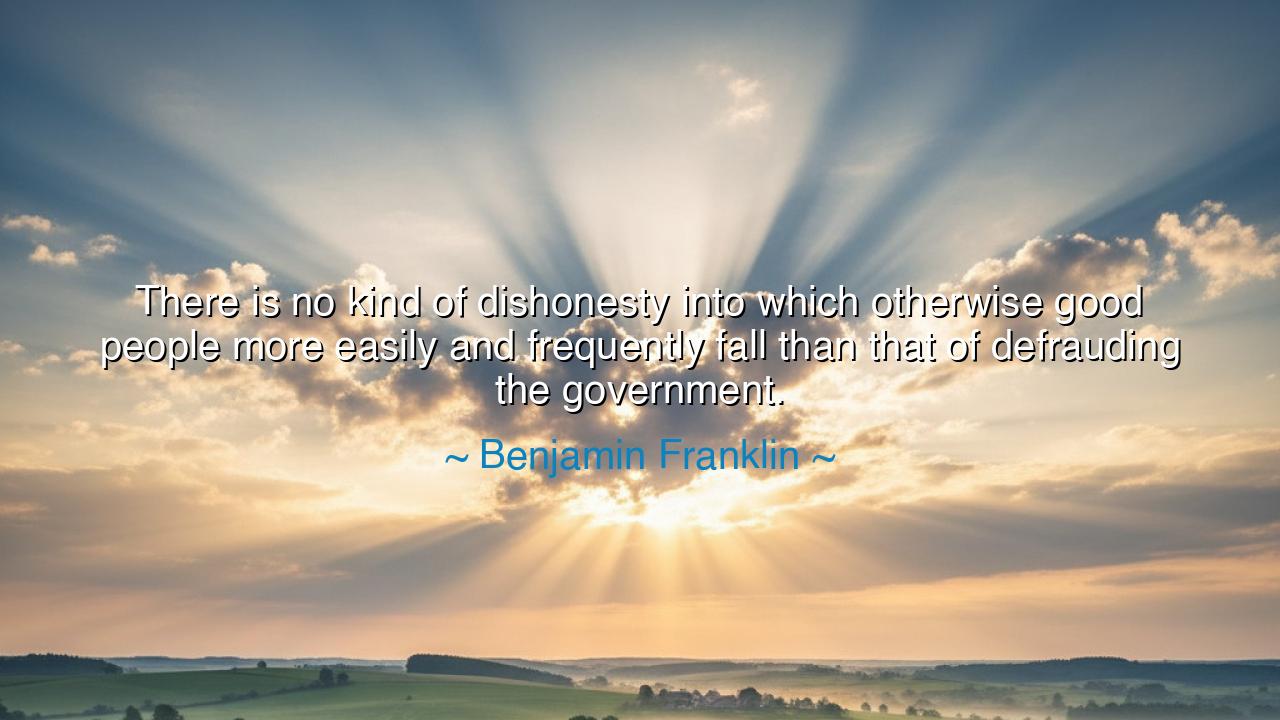
There is no kind of dishonesty into which otherwise good people
There is no kind of dishonesty into which otherwise good people more easily and frequently fall than that of defrauding the government.






The words of Benjamin Franklin — “There is no kind of dishonesty into which otherwise good people more easily and frequently fall than that of defrauding the government.” — shine like a mirror held up to human conscience. They reveal not merely the weakness of individuals, but the subtle hypocrisy of entire societies. In this statement, Franklin, one of the wisest architects of liberty, exposes a truth that pierces across centuries: that even the virtuous can deceive themselves when the victim of their deceit is the state, and that corruption, when shared by many, begins to seem like no sin at all. His warning is not merely against theft, but against the quiet erosion of civic virtue — the moment when love of self outweighs love of country.
Franklin spoke these words in the eighteenth century, when the fledgling American Republic was still young, still fragile, still learning the balance between freedom and duty. As one who had seen the cost of revolution and the labor of nation-building, he understood that the endurance of a free government depended not only on laws but on the integrity of its citizens. He had lived among both saints and scoundrels, and he knew the subtle ways in which good men justify wrongdoing. “The government,” many would say, “has plenty — it will not miss what I take.” Thus begins the corruption that poisons the well of liberty. Franklin, with the eye of a philosopher and the heart of a patriot, recognized that this form of dishonesty was the most dangerous — for it wears the mask of respectability and spreads quietly among those who think themselves righteous.
To defraud the government is not merely to steal from a faceless institution, but to betray the common trust — the shared treasury of the people. Franklin saw that in republics especially, where power comes from the consent of the governed, every act of deception against the state is an act of deception against one’s neighbor. The government is not a distant monarch or foreign ruler; it is the collective will and labor of all. When one man cheats it, all men suffer. Yet this truth is easily forgotten, for the victim is invisible, and the punishment often uncertain. Thus, Franklin’s insight burns like a lamp in the dark: dishonesty grows most easily where its harm seems least visible.
History offers countless examples of this decay. In ancient Rome, as the Republic grew rich, the citizens began to treat the state not as a sacred trust but as a source of plunder. Tax collectors demanded bribes; merchants avoided duties; magistrates enriched themselves under the pretense of public service. “Why not?” they said, “The state is strong; it can afford it.” But each small theft, each quiet fraud, chipped away at the foundation of civic faith, until the Republic rotted from within and the Caesars rose to rule over what free men had abandoned. The lesson is clear: where public trust is corrupted by private greed, liberty cannot long survive.
Even in our own age, Franklin’s warning remains as vital as ever. Men and women of every class, who would never steal from a friend or neighbor, will twist the truth on a tax form, take what is not theirs from public funds, or justify corruption in office with the words, “everyone does it.” Thus the same deceit that would shame them in private becomes acceptable when directed toward the government. But Franklin knew that a nation’s morality is measured not by how its people behave when watched, but by what they do when unseen. To defraud one’s government is to wound one’s own freedom, for it is the people’s trust that keeps the laws alive.
Franklin’s genius lay in understanding the heart of man — that the temptation to cheat the state is born not from wickedness alone, but from self-deception. We tell ourselves the government is corrupt, and so we justify our corruption; we say the system is unjust, and so we permit our injustice. But no government can be better than the souls of its citizens. The Republic, Franklin warned, could be kept only by those who govern themselves first. Self-government is the first government, and integrity is its law. A people who cannot be honest with their own institutions cannot hope to remain free.
So let this be the teaching carried through the ages: honesty is the foundation of liberty, and the smallest act of deceit against the public good weakens the fortress of freedom. Let each citizen remember that the government is not a distant master but a mirror of its people. Pay what you owe; give what you promise; protect what is shared. Teach your children not to mock the laws, but to honor them by conscience. For a just nation is not built by the hands of rulers alone, but by the hearts of those who live rightly when no one is watching.
And thus, remember Franklin’s eternal wisdom: to cheat the government is to cheat yourself. The dishonest man may gain silver, but he loses his country’s soul — and in time, his own. Better to live in honest poverty than in wealth won by deceit. For a free people, once accustomed to corruption, will one day awaken to find their freedom gone — not stolen by tyrants, but sold by their own hands.






AAdministratorAdministrator
Welcome, honored guests. Please leave a comment, we will respond soon